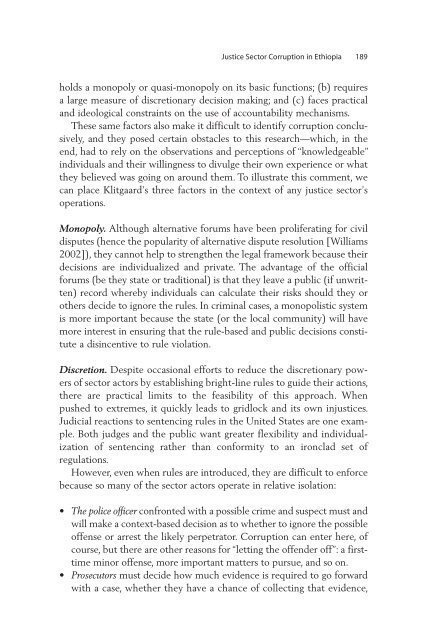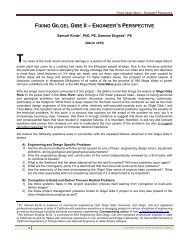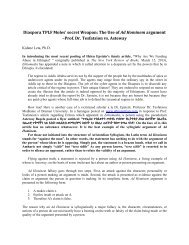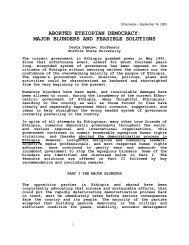- Page 1:
Public Disclosure Authorized Public
- Page 5 and 6:
Diagnosing Corruption in Ethiopia P
- Page 7 and 8:
Contents Foreword xiii Preface xv A
- Page 9 and 10:
Contents vii Chapter 6 Construction
- Page 11 and 12:
Contents ix Map 3.1 Ethiopian Regio
- Page 13 and 14:
Contents xi 3.6 Summary of Corrupti
- Page 15 and 16:
Foreword The government of the Fede
- Page 17 and 18:
Preface Although many would argue t
- Page 19:
Preface xvii Goldie-Scot, Piers Cro
- Page 22 and 23:
xx About the Editor and Authors bil
- Page 24 and 25:
xxii About the Editor and Authors g
- Page 26 and 27:
xxiv Abbreviations GAC Governance a
- Page 29 and 30:
CHAPTER 1 Overview Janelle Plummer
- Page 31 and 32:
Overview 3 Focusing on Ethiopia, th
- Page 33 and 34:
Overview 5 for their knowledge of c
- Page 35 and 36:
Overview 7 and group discussion wit
- Page 37 and 38:
Overview 9 analysis, Goldie-Scot ge
- Page 39 and 40:
Overview 11 Chapter 8: Telecommunic
- Page 41 and 42:
Overview 13 might be explained by t
- Page 43 and 44:
Overview 15 The perceptions of corr
- Page 45:
Overview 17 Given the Ethiopian gov
- Page 48 and 49:
20 Diagnosing Corruption in Ethiopi
- Page 50 and 51:
22 Diagnosing Corruption in Ethiopi
- Page 52 and 53:
24 Diagnosing Corruption in Ethiopi
- Page 54 and 55:
26 Diagnosing Corruption in Ethiopi
- Page 56 and 57:
28 Diagnosing Corruption in Ethiopi
- Page 58 and 59:
30 Diagnosing Corruption in Ethiopi
- Page 60 and 61:
32 Diagnosing Corruption in Ethiopi
- Page 62 and 63:
34 Diagnosing Corruption in Ethiopi
- Page 64 and 65:
36 Diagnosing Corruption in Ethiopi
- Page 66 and 67:
38 Diagnosing Corruption in Ethiopi
- Page 68 and 69:
40 Diagnosing Corruption in Ethiopi
- Page 70 and 71:
42 Diagnosing Corruption in Ethiopi
- Page 72 and 73:
44 Figure 2.4 Corruption Vulnerabil
- Page 74 and 75:
46 Diagnosing Corruption in Ethiopi
- Page 76 and 77:
48 Diagnosing Corruption in Ethiopi
- Page 78 and 79:
50 Diagnosing Corruption in Ethiopi
- Page 80 and 81:
52 Diagnosing Corruption in Ethiopi
- Page 82 and 83:
54 Diagnosing Corruption in Ethiopi
- Page 84 and 85:
56 Diagnosing Corruption in Ethiopi
- Page 86 and 87:
58 Diagnosing Corruption in Ethiopi
- Page 88 and 89:
60 Diagnosing Corruption in Ethiopi
- Page 90 and 91:
62 Diagnosing Corruption in Ethiopi
- Page 92 and 93:
64 Diagnosing Corruption in Ethiopi
- Page 94 and 95:
66 Diagnosing Corruption in Ethiopi
- Page 96 and 97:
68 Diagnosing Corruption in Ethiopi
- Page 98 and 99:
70 Diagnosing Corruption in Ethiopi
- Page 100 and 101:
72 Diagnosing Corruption in Ethiopi
- Page 102 and 103:
74 Diagnosing Corruption in Ethiopi
- Page 104 and 105:
76 Diagnosing Corruption in Ethiopi
- Page 106 and 107:
78 Diagnosing Corruption in Ethiopi
- Page 108 and 109:
80 Diagnosing Corruption in Ethiopi
- Page 110 and 111:
82 Diagnosing Corruption in Ethiopi
- Page 112 and 113:
84 Diagnosing Corruption in Ethiopi
- Page 114 and 115:
86 Diagnosing Corruption in Ethiopi
- Page 116 and 117:
88 Diagnosing Corruption in Ethiopi
- Page 118 and 119:
90 Diagnosing Corruption in Ethiopi
- Page 120 and 121:
92 Diagnosing Corruption in Ethiopi
- Page 122 and 123:
94 Diagnosing Corruption in Ethiopi
- Page 124 and 125:
96 Diagnosing Corruption in Ethiopi
- Page 126 and 127:
98 Diagnosing Corruption in Ethiopi
- Page 128 and 129:
100 Diagnosing Corruption in Ethiop
- Page 130 and 131:
102 Diagnosing Corruption in Ethiop
- Page 132 and 133:
104 Diagnosing Corruption in Ethiop
- Page 134 and 135:
106 Diagnosing Corruption in Ethiop
- Page 136 and 137:
108 Diagnosing Corruption in Ethiop
- Page 138 and 139:
110 Diagnosing Corruption in Ethiop
- Page 140 and 141:
112 Diagnosing Corruption in Ethiop
- Page 142 and 143:
114 Diagnosing Corruption in Ethiop
- Page 144 and 145:
116 Diagnosing Corruption in Ethiop
- Page 146 and 147:
118 Diagnosing Corruption in Ethiop
- Page 148 and 149:
120 Diagnosing Corruption in Ethiop
- Page 150 and 151:
122 Diagnosing Corruption in Ethiop
- Page 152 and 153:
124 Diagnosing Corruption in Ethiop
- Page 154 and 155:
126 Diagnosing Corruption in Ethiop
- Page 156 and 157:
128 Diagnosing Corruption in Ethiop
- Page 158 and 159:
130 Diagnosing Corruption in Ethiop
- Page 160 and 161:
132 Diagnosing Corruption in Ethiop
- Page 162 and 163:
134 Diagnosing Corruption in Ethiop
- Page 164 and 165:
136 Diagnosing Corruption in Ethiop
- Page 166 and 167: 138 Diagnosing Corruption in Ethiop
- Page 168 and 169: 140 Diagnosing Corruption in Ethiop
- Page 170 and 171: 142 Diagnosing Corruption in Ethiop
- Page 172 and 173: 144 Diagnosing Corruption in Ethiop
- Page 174 and 175: 146 Diagnosing Corruption in Ethiop
- Page 176 and 177: 148 Diagnosing Corruption in Ethiop
- Page 178 and 179: 150 Diagnosing Corruption in Ethiop
- Page 180 and 181: 152 Diagnosing Corruption in Ethiop
- Page 182 and 183: 154 Table 4.4 Corruption Risk in Bo
- Page 184 and 185: 156 Diagnosing Corruption in Ethiop
- Page 186 and 187: 158 Diagnosing Corruption in Ethiop
- Page 188 and 189: 160 Diagnosing Corruption in Ethiop
- Page 190 and 191: 162 Diagnosing Corruption in Ethiop
- Page 192 and 193: 164 Diagnosing Corruption in Ethiop
- Page 194 and 195: 166 Diagnosing Corruption in Ethiop
- Page 196 and 197: 168 Diagnosing Corruption in Ethiop
- Page 198 and 199: 170 Diagnosing Corruption in Ethiop
- Page 200 and 201: 172 Annex 4.1 Ethiopian RWS Borehol
- Page 202 and 203: 174 Diagnosing Corruption in Ethiop
- Page 204 and 205: 176 Diagnosing Corruption in Ethiop
- Page 206 and 207: 178 Diagnosing Corruption in Ethiop
- Page 209 and 210: CHAPTER 5 Justice Sector Corruption
- Page 211 and 212: Justice Sector Corruption in Ethiop
- Page 213 and 214: Justice Sector Corruption in Ethiop
- Page 215: Justice Sector Corruption in Ethiop
- Page 219 and 220: Justice Sector Corruption in Ethiop
- Page 221 and 222: Justice Sector Corruption in Ethiop
- Page 223 and 224: Justice Sector Corruption in Ethiop
- Page 225 and 226: Table 5.1 (continued) Justice Secto
- Page 227 and 228: Table 5.1 (continued) Justice Secto
- Page 229 and 230: Justice Sector Corruption in Ethiop
- Page 231 and 232: Justice Sector Corruption in Ethiop
- Page 233 and 234: 205 Table 5.2 Disposition of Civil
- Page 235 and 236: Justice Sector Corruption in Ethiop
- Page 237 and 238: Justice Sector Corruption in Ethiop
- Page 239 and 240: Justice Sector Corruption in Ethiop
- Page 241 and 242: Justice Sector Corruption in Ethiop
- Page 243 and 244: Justice Sector Corruption in Ethiop
- Page 245 and 246: Table 5.4 (continued) Justice Secto
- Page 247 and 248: Justice Sector Corruption in Ethiop
- Page 249 and 250: Justice Sector Corruption in Ethiop
- Page 251 and 252: Justice Sector Corruption in Ethiop
- Page 253 and 254: Justice Sector Corruption in Ethiop
- Page 255 and 256: Justice Sector Corruption in Ethiop
- Page 257 and 258: Justice Sector Corruption in Ethiop
- Page 259 and 260: Justice Sector Corruption in Ethiop
- Page 261 and 262: Justice Sector Corruption in Ethiop
- Page 263 and 264: Justice Sector Corruption in Ethiop
- Page 265 and 266: CHAPTER 6 Construction Sector Corru
- Page 267 and 268:
Construction Sector Corruption in E
- Page 269 and 270:
Construction Sector Corruption in E
- Page 271 and 272:
Construction Sector Corruption in E
- Page 273 and 274:
Construction Sector Corruption in E
- Page 275 and 276:
Construction Sector Corruption in E
- Page 277 and 278:
Construction Sector Corruption in E
- Page 279 and 280:
Construction Sector Corruption in E
- Page 281 and 282:
Table 6.3 (continued) Construction
- Page 283 and 284:
Table 6.4 (continued) Construction
- Page 285 and 286:
Construction Sector Corruption in E
- Page 287 and 288:
Construction Sector Corruption in E
- Page 289 and 290:
Construction Sector Corruption in E
- Page 291 and 292:
263 Table 6.7 Overview of Perceived
- Page 293 and 294:
Construction Sector Corruption in E
- Page 295 and 296:
Construction Sector Corruption in E
- Page 297 and 298:
Figure 6.2 Trends in Unit Cost of D
- Page 299 and 300:
Box 6.1 (continued) Construction Se
- Page 301 and 302:
Construction Sector Corruption in E
- Page 303 and 304:
Construction Sector Corruption in E
- Page 305 and 306:
277 Figure 6.5 Drivers of Corruptio
- Page 307 and 308:
Construction Sector Corruption in E
- Page 309 and 310:
Construction Sector Corruption in E
- Page 311:
Construction Sector Corruption in E
- Page 314 and 315:
286 Diagnosing Corruption in Ethiop
- Page 316 and 317:
288 Diagnosing Corruption in Ethiop
- Page 318 and 319:
290 Diagnosing Corruption in Ethiop
- Page 320 and 321:
292 Table 7.1 Value Chain Analysis
- Page 322 and 323:
294 Diagnosing Corruption in Ethiop
- Page 324 and 325:
296 Diagnosing Corruption in Ethiop
- Page 326 and 327:
298 Diagnosing Corruption in Ethiop
- Page 328 and 329:
300 Diagnosing Corruption in Ethiop
- Page 330 and 331:
302 Diagnosing Corruption in Ethiop
- Page 332 and 333:
304 Diagnosing Corruption in Ethiop
- Page 334 and 335:
306 Diagnosing Corruption in Ethiop
- Page 336 and 337:
308 Diagnosing Corruption in Ethiop
- Page 338 and 339:
310 Diagnosing Corruption in Ethiop
- Page 340 and 341:
312 Diagnosing Corruption in Ethiop
- Page 342 and 343:
314 Diagnosing Corruption in Ethiop
- Page 344 and 345:
316 Diagnosing Corruption in Ethiop
- Page 346 and 347:
318 Diagnosing Corruption in Ethiop
- Page 348 and 349:
320 Diagnosing Corruption in Ethiop
- Page 350 and 351:
322 Diagnosing Corruption in Ethiop
- Page 352 and 353:
324 Diagnosing Corruption in Ethiop
- Page 354 and 355:
326 Diagnosing Corruption in Ethiop
- Page 356 and 357:
328 Diagnosing Corruption in Ethiop
- Page 358 and 359:
330 Diagnosing Corruption in Ethiop
- Page 360 and 361:
332 Diagnosing Corruption in Ethiop
- Page 362 and 363:
334 Diagnosing Corruption in Ethiop
- Page 364 and 365:
336 Figure 8.2 Current Institutiona
- Page 366 and 367:
338 Diagnosing Corruption in Ethiop
- Page 368 and 369:
340 Diagnosing Corruption in Ethiop
- Page 370 and 371:
342 Diagnosing Corruption in Ethiop
- Page 372 and 373:
344 Diagnosing Corruption in Ethiop
- Page 374 and 375:
346 Diagnosing Corruption in Ethiop
- Page 376 and 377:
348 Diagnosing Corruption in Ethiop
- Page 378 and 379:
350 Diagnosing Corruption in Ethiop
- Page 380 and 381:
352 Diagnosing Corruption in Ethiop
- Page 382 and 383:
354 Diagnosing Corruption in Ethiop
- Page 384 and 385:
356 Diagnosing Corruption in Ethiop
- Page 386 and 387:
358 Diagnosing Corruption in Ethiop
- Page 388 and 389:
360 Diagnosing Corruption in Ethiop
- Page 390 and 391:
362 Diagnosing Corruption in Ethiop
- Page 392 and 393:
364 Diagnosing Corruption in Ethiop
- Page 394 and 395:
366 Diagnosing Corruption in Ethiop
- Page 396 and 397:
368 Diagnosing Corruption in Ethiop
- Page 398 and 399:
370 Diagnosing Corruption in Ethiop
- Page 400 and 401:
372 Diagnosing Corruption in Ethiop
- Page 402 and 403:
374 Diagnosing Corruption in Ethiop
- Page 405 and 406:
CHAPTER 9 Corruption in the Mining
- Page 407 and 408:
Corruption in the Mining Sector: Pr
- Page 409 and 410:
Corruption in the Mining Sector: Pr
- Page 411 and 412:
Corruption in the Mining Sector: Pr
- Page 413 and 414:
Corruption in the Mining Sector: Pr
- Page 415 and 416:
Corruption in the Mining Sector: Pr
- Page 417 and 418:
MOM asks regional or city licensing
- Page 419 and 420:
Corruption in the Mining Sector: Pr
- Page 421 and 422:
Corruption in the Mining Sector: Pr
- Page 423 and 424:
Corruption in the Mining Sector: Pr
- Page 425 and 426:
Corruption in the Mining Sector: Pr
- Page 427 and 428:
Corruption in the Mining Sector: Pr
- Page 429 and 430:
Corruption in the Mining Sector: Pr
- Page 431 and 432:
Corruption in the Mining Sector: Pr
- Page 433 and 434:
Corruption in the Mining Sector: Pr
- Page 435 and 436:
Corruption in the Mining Sector: Pr
- Page 437 and 438:
Corruption in the Mining Sector: Pr
- Page 439 and 440:
Corruption in the Mining Sector: Pr
- Page 441 and 442:
Corruption in the Mining Sector: Pr
- Page 443 and 444:
Corruption in the Mining Sector: Pr
- Page 445:
Corruption in the Mining Sector: Pr

















